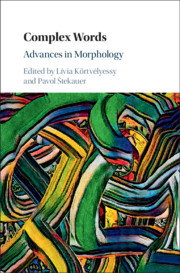Complex Words
Advances in Morphology
£100.00
- Editors:
- Lívia Körtvélyessy, P. J. Šafárik University, Košice, Slovakia
- Pavol Štekauer, P. J. Šafárik University, Košice, Slovakia
- Date Published: October 2020
- availability: Available
- format: Hardback
- isbn: 9781108490290
£
100.00
Hardback
Other available formats:
Paperback, eBook
Looking for an inspection copy?
This title is not currently available on inspection
-
A state-of-the-art survey of complex words, this volume brings together a team of leading international morphologists to demonstrate the wealth and breadth of the study of word-formation. Encompassing methodological, empirical and theoretical approaches, each chapter presents the results of cutting-edge research into linguistic complexity, including lexico-semantic aspects of complex words, the structure of complex words, and corpus-based case studies. Drawing on examples from a wide range of languages, it covers both general aspects of word-formation, and aspects specific to particular languages, such as English, French, Greek, Basque, Spanish, German and Slovak. Theoretical considerations are supported by a number of in-depth case studies focusing on the role of affixes, as well as word-formation processes such as compounding, affixation and conversion. Attention is also devoted to typological issues in word-formation. The book will be an invaluable resource for academic researchers and graduate students interested in morphology, linguistic typology and corpus linguistics.
Read more- Includes papers by leading international morphologists, representing various theoretical frameworks, to provide state-of-the-art research in various areas of word-formation
- Covers word-formation in a wide range of languages
- Includes both theoretical and empirical research
Reviews & endorsements
'By uniting the world's top morphologists in a single volume, this book offers an exclusive insight into how current theories tackle some of the most challenging – and exciting – aspects of complex words. A comprehensive and accessible account of the latest advances in morphology that is set to become a modern classic.' Réka Benczes, Corvinus University of Budapest
Customer reviews
17th Oct 2024 by UName-652396
Review copy request: Complex Words. Advances in Morphology (to be published Oct. 2020 and reviewed in Archivio Glottologico Italiano) Paolo Ramat, Editor-in-Chief of the Arch.Glottol. Ital.)
Review was not posted due to profanity
×Product details
- Date Published: October 2020
- format: Hardback
- isbn: 9781108490290
- length: 320 pages
- dimensions: 160 x 235 x 30 mm
- weight: 0.73kg
- availability: Available
Table of Contents
Introduction: advances in morphology: a summary Jan Don and Martin Everaert
Part I. Lexico-Semantic Aspects of Complex Words:
1. Formal semantics and the problem of nominalizations Rochelle Lieber
2. Semantically subtractive morphology Stephen Anderson
3. -less and –free Mark Aronoff
4. Instrument Nouns in -one in Latin and Romance Franz Rainer
5. Prominence in noun-to-verb conversion Heike Baeskow
6. On Spanish dvandva and its restrictions Antonio Fábregas
Part II. Structure of Complex Words:
7. Estonian case inflection made simple. A case study in word and paradigm morphology with linear discriminative learning Yu-Ying Chuang, Kaidi Lõo, James P. Blevins, and R. Harald Baayen
8. Uninflectedness: uninflecting, uninflectable, and uninflected words, or the complexity of the simplex Andrew Spencer
9. Complex exponents Gregory Stump
10. Derivational patterns in proto-basque word structure Juliette Blevins
11. The complexity of greek verbal morphology: the case of prefixed verbs Artemis Alexiadou
12. Affixoids, an intriguing intermediate category Angela Ralli
Part III. Corpus-Based Case Studies:
13. Competition between synthetic nn compounds and nn.GEN phrasal nouns in polish: semantic niches, hapax legomena and low-level construction schemas Bozena Cetnarowska
14. An s is an s', or is it? Plural and genitive-plural are not homophonous Ingo Plag, Sonia Ben Hedia, Arne Lohmann, and Julia Zimmermann
15. The role of word-formation families and subfamilies in the organisation of German diminutive compounds Wolfgang U. Dressler, Sonja Schwaiger, and Jutta Ransmayr
16. Semantic patterns in noun-to-verb conversion in English Salvador Valera
17. Onomatopoeia: on the crossroads of sound symbolism and word-formation Lívia Körtvélyessy, and Pavol Štekauer
18. Dingsbums and thingy: placeholders for names in German and other languages Petra M. Vogel.
Sorry, this resource is locked
Please register or sign in to request access. If you are having problems accessing these resources please email [email protected]
Register Sign in» Proceed
You are now leaving the Cambridge University Press website. Your eBook purchase and download will be completed by our partner www.ebooks.com. Please see the permission section of the www.ebooks.com catalogue page for details of the print & copy limits on our eBooks.
Continue ×Are you sure you want to delete your account?
This cannot be undone.
Thank you for your feedback which will help us improve our service.
If you requested a response, we will make sure to get back to you shortly.
×



